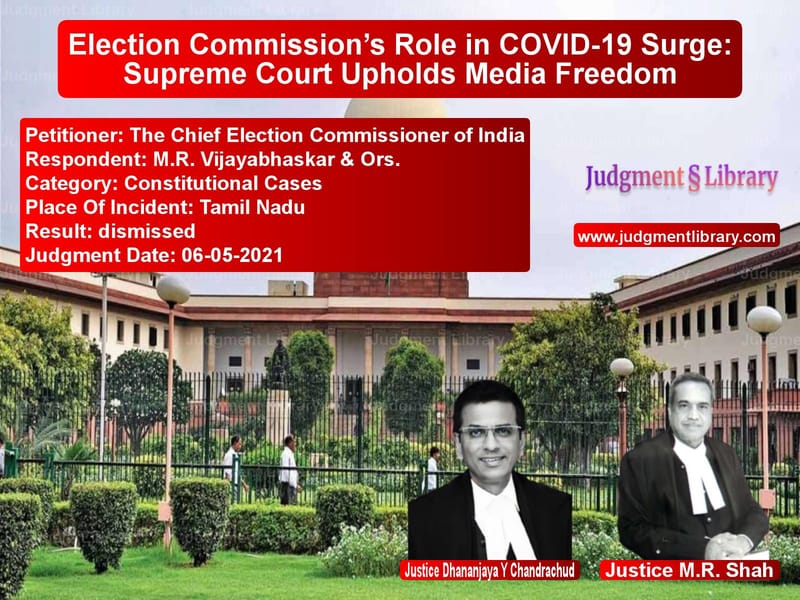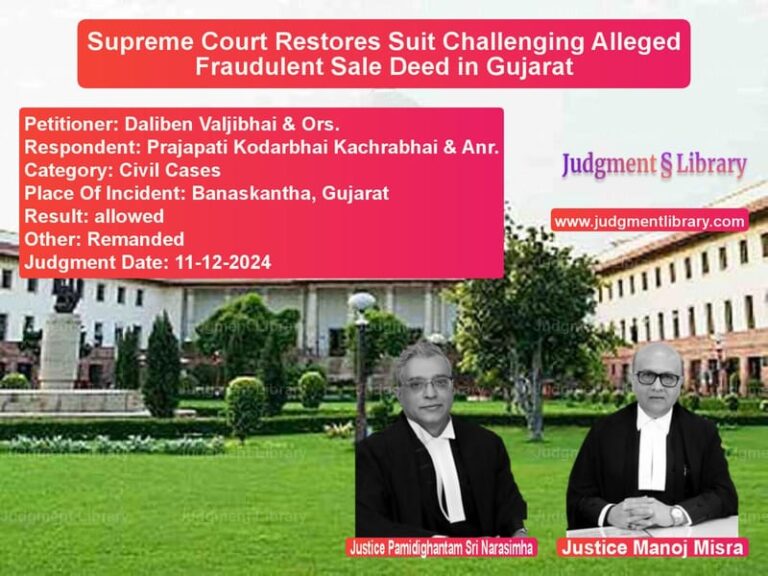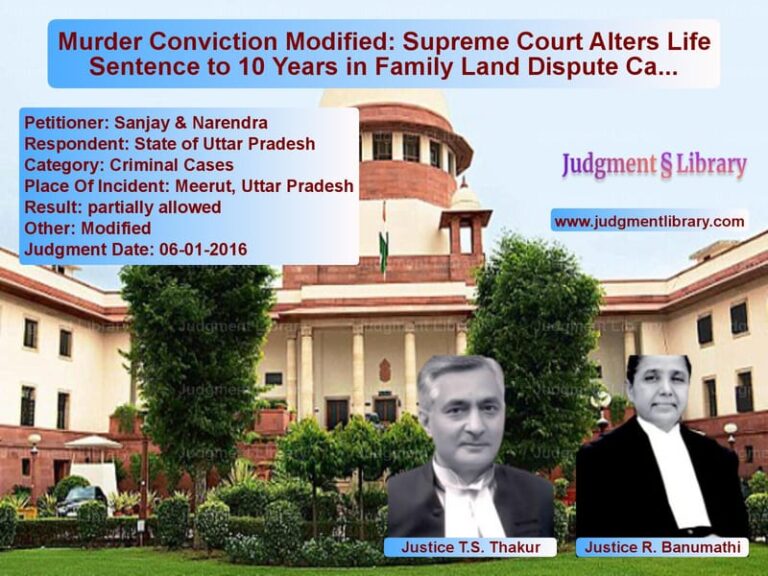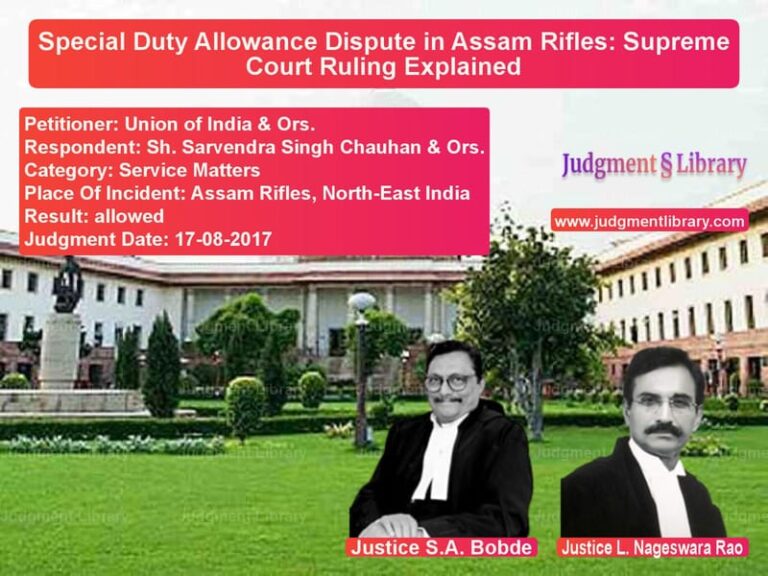Election Commission’s Role in COVID-19 Surge: Supreme Court Upholds Media Freedom
The Supreme Court of India delivered a landmark judgment addressing the balance between judicial remarks, media freedom, and the authority of the Election Commission (EC) in managing the electoral process during the COVID-19 pandemic. The case, The Chief Election Commissioner of India v. M.R. Vijayabhaskar & Ors., arose from controversial oral remarks made by the Madras High Court that held the EC responsible for the surge in COVID-19 cases due to election rallies.
Background of the Case
The case originated from a writ petition filed before the Madras High Court by M.R. Vijayabhaskar, a candidate from the AIADMK party. The petition sought directions to ensure compliance with COVID-19 safety protocols during the vote-counting process in Tamil Nadu’s 135-Karur Legislative Assembly Constituency. During the hearings, the Madras High Court reportedly remarked that the EC was “the institution that is singularly responsible for the second wave of COVID-19” and that EC officials “should be put up for murder charges.”
The EC moved the Supreme Court, arguing that such remarks tarnished its image and undermined its authority as an independent constitutional body.
Arguments by the Petitioner (Election Commission)
The Election Commission, represented by Senior Advocate Rakesh Dwivedi, raised the following concerns:
- The Madras High Court’s oral remarks were harsh, unnecessary, and baseless, affecting the credibility of the EC.
- The observations were widely reported in the media, damaging public confidence in the electoral process.
- The remarks were not part of the official order, yet they led to the filing of an FIR against EC officials under charges including Section 304 of the IPC (culpable homicide).
- The EC had taken extensive measures to enforce COVID-19 protocols, including issuing guidelines and warnings to political parties.
- The responsibility for enforcing COVID-19 safety measures lay with state governments, not solely with the EC.
- The High Court’s failure to rule on the EC’s miscellaneous application violated its right to be heard.
- The media should be restrained from reporting oral remarks made by judges, as they do not form part of the judicial record.
Arguments by the Respondent (M.R. Vijayabhaskar & Others)
The respondents, represented by Advocate Pradeep Kumar Yadav, countered the EC’s claims:
- The EC had broad powers during elections, including control over law enforcement and public safety measures.
- Despite repeated warnings from the Madras High Court, the EC failed to ensure compliance with COVID-19 guidelines.
- The EC’s actions during the election process had real-life consequences, making it fair for the judiciary to question its role.
- The media’s role is to report proceedings in an open democracy, and any attempt to curtail it would violate Article 19(1)(a) of the Constitution.
Supreme Court’s Observations and Judgment
1. Importance of Open Courts and Media Freedom
The Supreme Court strongly affirmed that judicial proceedings must remain open to public scrutiny, stating:
“Citizens have a right to know about what transpires in the course of judicial proceedings. An open court proceeding ensures that the judicial process is subject to public scrutiny.”
The Court emphasized that restricting media reporting on oral observations would set a dangerous precedent against transparency.
2. Judicial Remarks and Their Impact
The Court acknowledged that the Madras High Court’s remarks were strong and that judges should exercise caution in their language:
“The remarks of the High Court were harsh. The metaphor inappropriate. A degree of caution and circumspection by the High Court would have allayed a grievance of the nature that has been urged in the present case.”
However, the Court clarified that oral observations made during proceedings do not constitute a judicial order and are not legally binding.
3. Accountability of the Election Commission
The Supreme Court rejected the EC’s claim that it should be immune from judicial oversight:
“The Election Commission is not above the Constitution. Judicial scrutiny of its actions, especially in a crisis like a pandemic, is essential to ensure accountability.”
The Court noted that while the EC had taken some steps, it could have been more proactive in enforcing COVID-19 safety measures during election rallies.
4. Rejection of EC’s Plea to Restrict Media
The Court firmly dismissed the EC’s request to prevent media from reporting oral observations made during hearings:
“This Court stands as a staunch proponent of the freedom of the media to report court proceedings. This is integral to the freedom of speech and expression of those who speak, of those who wish to hear and to be heard, and above all, in holding the judiciary accountable.”
The judgment reaffirmed that judicial proceedings should remain transparent and that any attempt to restrict media reporting would be unconstitutional.
Final Verdict
The Supreme Court disposed of the appeal, stating:
“The oral remarks during the course of the hearing have passed with the moment and do not constitute a part of the record. The matter should rest with a sense of balance.”
The Court did not expunge the High Court’s remarks, noting that they were not part of the official order. However, it cautioned judges to use measured language to avoid unnecessary controversy.
Conclusion
This ruling reaffirms the fundamental principles of judicial transparency, media freedom, and constitutional accountability. It underscores that while judicial remarks should be made with caution, the judiciary has a duty to question constitutional bodies when necessary. The decision also highlights the importance of responsible governance in times of crisis and ensures that democratic institutions remain accountable to the people.
Petitioner Name: The Chief Election Commissioner of India.Respondent Name: M.R. Vijayabhaskar & Ors..Judgment By: Justice Dhananjaya Y Chandrachud, Justice M.R. Shah.Place Of Incident: Tamil Nadu.Judgment Date: 06-05-2021.
Don’t miss out on the full details! Download the complete judgment in PDF format below and gain valuable insights instantly!
Download Judgment: the-chief-election-c-vs-m.r.-vijayabhaskar-&-supreme-court-of-india-judgment-dated-06-05-2021.pdf
Directly Download Judgment: Directly download this Judgment
See all petitions in Fundamental Rights
See all petitions in Public Interest Litigation
See all petitions in Separation of Powers
See all petitions in Judgment by Dhananjaya Y Chandrachud
See all petitions in Judgment by Mukeshkumar Rasikbhai Shah
See all petitions in dismissed
See all petitions in supreme court of India judgments May 2021
See all petitions in 2021 judgments
See all posts in Constitutional Cases Category
See all allowed petitions in Constitutional Cases Category
See all Dismissed petitions in Constitutional Cases Category
See all partially allowed petitions in Constitutional Cases Category







